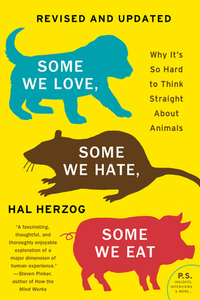Take a photo of a barcode or cover
172 reviews for:
Some We Love, Some We Hate, Some We Eat: Why It's So Hard to Think Straight About Animals
Hal Herzog
172 reviews for:
Some We Love, Some We Hate, Some We Eat: Why It's So Hard to Think Straight About Animals
Hal Herzog
reflective
slow-paced
I was feeling up to reading some non-fiction, and found this ebook in my kindle, so I read it. I remember reading the synopsis and going "I have to get this", and that's what I did. But it was so long ago, I sort of forgot of its existence, until I found it again.
I'm surprised at how easy a read this is. Author adds in interesting statistics (doesn't go overboard and bore you out), and also interesting anecdotes.
There are parts where he digresses just a bit too much, but it actually makes this feel more like a blog read.
Interesting facts and analysis, and probes at some real hard questions too. What would I do in some situations presented? I have no idea, and I don't really want to ponder that. Ah, the distancing thing he mentioned.
I'm surprised at how easy a read this is. Author adds in interesting statistics (doesn't go overboard and bore you out), and also interesting anecdotes.
There are parts where he digresses just a bit too much, but it actually makes this feel more like a blog read.
Interesting facts and analysis, and probes at some real hard questions too. What would I do in some situations presented? I have no idea, and I don't really want to ponder that. Ah, the distancing thing he mentioned.
Kept my mind going back and forth from yes I agree with what he says, to what he doesn't. But it gives an open point of view, which doesn't lead the reader to be influenced by one set of biases.
Makes you think about where you draw the line.
Someone asked me if I had a choice to save a human's life and a dog's life who would I save,
My first reaction was to save the dog's, because in my head, they are purer, no harm done in the world, because they don't know of harm.
but would I put my family's life above a dog's?
Makes you think about where you draw the line.
Someone asked me if I had a choice to save a human's life and a dog's life who would I save,
My first reaction was to save the dog's, because in my head, they are purer, no harm done in the world, because they don't know of harm.
but would I put my family's life above a dog's?
I really enjoyed this book, it was an interesting and engaging read. I have always been fascinated by the human animal relationship. This fascination has lead me through many years of awkward vegetarianism, followed by years of animal activism and at the end of all this I still remain in a quagmire about animals and how we relate to them morally.
This book tied in all my wonderings in an engaging exploration of the topic.
Herzog, adresses all our questions when it comes to our interactions with other species. He pulls in everything from cock fighting, to experimentation on animals onto the plate and demands that we look at these things with the mind of a psychologist. This is a book that I would suggest to anyone who is interested in Animals and how we interact with them.
This book tied in all my wonderings in an engaging exploration of the topic.
Herzog, adresses all our questions when it comes to our interactions with other species. He pulls in everything from cock fighting, to experimentation on animals onto the plate and demands that we look at these things with the mind of a psychologist. This is a book that I would suggest to anyone who is interested in Animals and how we interact with them.
Some We Love, Some We Hate, Some We Eat: Why It's So Hard to Think Straight About Animals
By Hal Herzog
3 1/2 Stars
The title pretty much gives you all you need to know about the book. It is an indepth look at humans and their conflicting views on animals. I have to say that this is one of the most interesting books I've read recently. The author is a psychologist and is considered an expert on human-animal relations. He tells you straight up that he is "conflicted about our ethical obligations to animals". He admits that he eats meat, opposes the testing of oven cleaner on animals, but would sacrifice mice to find a cure for cancer. So he is clearly not pro one side or the other. His research is also conflicting, but gives the reader lots to think about and contemplate.
The book covers areas from pets and animal fights to research and which animals we choose to eat. These are some of the things I found to be interesting:
The cute factor:
People tend to like animals more, if they are cute. In fact, humans have gone so far as to start breeding cuter animals. Unfortunately, the animals are the ones that suffer our vanity. The snouts of Chinese pugs and French bulldogs have caused respiratory issues and their bulging eyes barely fit into their eye sockets. This breeding has also caused mental issues in pets, in which companies have taken advantage of. There are actually pet versions of Valium and Prozac.
Bizarre morals:
Hitler objected to killing animals for research. He was a vegetarian and found meat disgusting. Yet, he had no trouble killing other human beings.
Americans & their pets:
While most people consider their pets to be a part of their family, so people go to the extreme. Herzog titled this, "Turning pets into people". The amount of money spent on pets has skyrocketed in the last 10 years. The amount is more than movies, video games, and music combined. $17 billion for food, $12 billion for vets, $10 billion for supplies such as kitty litter, and $3 billion for things such as dog walkers, pet massages, and new age animal communicators. Extreme items have also become available, such as the $3000 Swarovski dress offered at a pet boutique.
Pets as a hazard to your health:
60% of the pathogens that humans are susceptible come from animals. Some of those include roundworm, ringworm, E.Coli, hookworm, and cat scratch fever. 85% of baby turtles carry salmonella, and there are 75,000 cases of infection from reptiles each year. Even therapy pets have been known to carry MRSA.
Chickens we eat Vs. Cockfighting:
In his research, Herzog actually found that, despite it's negativity, chickens involved in cockfighting are treated a whole lot better than those who end up on our dinner plates. The cockfighter is actually pampered during its life. They run free and even have their own bedroom to sleep in. The chickens we eat never see the sun, are top heavy, so they have to spend most of their time laying down, and often develop blisters and sores on their feet.
What we eat:
Culture is by far the most important factor when it comes to what animals we will eat and which ones we won't. What is considered disgusting in one culture is a delicacy in another. Take dog for example. Americans are disgusted by the idea of eating dog, yet the Aztecs developed a hairless dog specifically for eating. In Asia, nearly 16 million dogs are eaten every year.
People view animal flesh as disgusting, which is why we see meat packaged the way it is today. We see more packages of single parts than we do of the whole animal. **And I have to admit, that when I cook a whole chicken, the sight of it (especially where the neck bone comes out) grosses me out, while cutting up boneless chicken breasts doesn't.**
Research using animals:
Although many people oppose research using animals, there are many things we would be without without it. Some of these include vaccinations for polio and MMR. There would not be antibiotics, blood transfusion, open heart surgery, insulin, and medication for epilepsy, depression, hypertension, or ulcers. Pets wouldn't have rabies vaccinations, nor would there be treatments for heartworm or cancers. Testing on animals is one of the biggest controversies when it comes to animal rights. When he asked his students whether it would be better to test on animals or an infant that is blind, deaf, and incapable of experience pain, many students responded neither. They felt we should conduct our biomedical experiments on death row inmates.
By Hal Herzog
3 1/2 Stars
The title pretty much gives you all you need to know about the book. It is an indepth look at humans and their conflicting views on animals. I have to say that this is one of the most interesting books I've read recently. The author is a psychologist and is considered an expert on human-animal relations. He tells you straight up that he is "conflicted about our ethical obligations to animals". He admits that he eats meat, opposes the testing of oven cleaner on animals, but would sacrifice mice to find a cure for cancer. So he is clearly not pro one side or the other. His research is also conflicting, but gives the reader lots to think about and contemplate.
The book covers areas from pets and animal fights to research and which animals we choose to eat. These are some of the things I found to be interesting:
The cute factor:
People tend to like animals more, if they are cute. In fact, humans have gone so far as to start breeding cuter animals. Unfortunately, the animals are the ones that suffer our vanity. The snouts of Chinese pugs and French bulldogs have caused respiratory issues and their bulging eyes barely fit into their eye sockets. This breeding has also caused mental issues in pets, in which companies have taken advantage of. There are actually pet versions of Valium and Prozac.
Bizarre morals:
Hitler objected to killing animals for research. He was a vegetarian and found meat disgusting. Yet, he had no trouble killing other human beings.
Americans & their pets:
While most people consider their pets to be a part of their family, so people go to the extreme. Herzog titled this, "Turning pets into people". The amount of money spent on pets has skyrocketed in the last 10 years. The amount is more than movies, video games, and music combined. $17 billion for food, $12 billion for vets, $10 billion for supplies such as kitty litter, and $3 billion for things such as dog walkers, pet massages, and new age animal communicators. Extreme items have also become available, such as the $3000 Swarovski dress offered at a pet boutique.
Pets as a hazard to your health:
60% of the pathogens that humans are susceptible come from animals. Some of those include roundworm, ringworm, E.Coli, hookworm, and cat scratch fever. 85% of baby turtles carry salmonella, and there are 75,000 cases of infection from reptiles each year. Even therapy pets have been known to carry MRSA.
Chickens we eat Vs. Cockfighting:
In his research, Herzog actually found that, despite it's negativity, chickens involved in cockfighting are treated a whole lot better than those who end up on our dinner plates. The cockfighter is actually pampered during its life. They run free and even have their own bedroom to sleep in. The chickens we eat never see the sun, are top heavy, so they have to spend most of their time laying down, and often develop blisters and sores on their feet.
What we eat:
Culture is by far the most important factor when it comes to what animals we will eat and which ones we won't. What is considered disgusting in one culture is a delicacy in another. Take dog for example. Americans are disgusted by the idea of eating dog, yet the Aztecs developed a hairless dog specifically for eating. In Asia, nearly 16 million dogs are eaten every year.
People view animal flesh as disgusting, which is why we see meat packaged the way it is today. We see more packages of single parts than we do of the whole animal. **And I have to admit, that when I cook a whole chicken, the sight of it (especially where the neck bone comes out) grosses me out, while cutting up boneless chicken breasts doesn't.**
Research using animals:
Although many people oppose research using animals, there are many things we would be without without it. Some of these include vaccinations for polio and MMR. There would not be antibiotics, blood transfusion, open heart surgery, insulin, and medication for epilepsy, depression, hypertension, or ulcers. Pets wouldn't have rabies vaccinations, nor would there be treatments for heartworm or cancers. Testing on animals is one of the biggest controversies when it comes to animal rights. When he asked his students whether it would be better to test on animals or an infant that is blind, deaf, and incapable of experience pain, many students responded neither. They felt we should conduct our biomedical experiments on death row inmates.
A fun and accessible book full of cocktail party statistics. The verdict: humans are wildly inconsistent in their logic and beliefs, especially when it comes to animals.
This isn’t a spoiler, I just think it’s important to know going into this: the author doesn’t come down super firmly on any particular side of the debates this book discusses regarding human-animal relationships. And honestly? I think that’s fine. I’m a vegetarian, but I know that choice isn’t viable for everyone (due to money, health, or many other factors). I don’t think people who eat meat but love their pets are hypocrites. I like that this book advocates for nuance in our feelings about animals. But if you’re looking for a book that will either make you feel 100% justified in eating meat or 100% on the moral high ground for being a hardcore vegan, this will do neither.
The thing I didn’t enjoy was the chapter about gendered tendencies in attitudes toward animals. The author makes a little much of “gender benders” (like women who somehow hunt animals without their maternal instinct kicking in??
The thing I didn’t enjoy was the chapter about gendered tendencies in attitudes toward animals. The author makes a little much of “gender benders” (like women who somehow hunt animals without their maternal instinct kicking in??
informative
reflective
medium-paced
I enjoyed reading it since I have always found a logical and moral conflict in me when I eat meat! I liked how the author has woven together the philosophies, the behavioral sciences and the human experiences together to paint an eloquent picture of the complexities of human-other animal relationships. Also loved learning about all the wonderful animal refuge and protection initiatives. Added them to my “places to go” list.
informative
reflective
slow-paced
Meandering and given to the occasional distracting diversion, I was left a little disappointed by Hal Herzog's book about our relationships with animals. There is a myth about objectivity in our culture, Herzog tries and in my opinion fails to maintain it. I suppose that's the point - Herzog gives us a variety of viewpoints and then, if I don't miss the mark, tells us that it's up to us to make our own rules about animals. Except that his cultural bias slips in at various points and reminds us that "x" is right and "y" is wrong. "Oops, just joking," says Herzog, "moving on." Maybe there's some meta level of writing going on where he's trying to remind us at every turn that we have a cultural bias too. But it really felt to me like he was passing judgement on anyone who would eat a cat or a dog or a monkey while telling us about how tasty the chicken he ate last night was. Perhaps it deserves a higher rating simply for making me question and examine some of my actions, because it succeeded on that point. In the end, it's just a little bit too dismissive.




